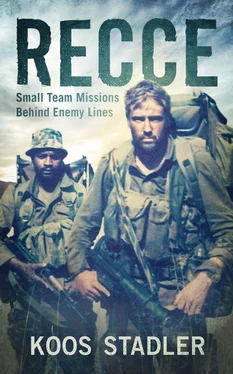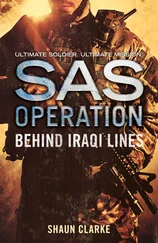In between deployments a few of the men challenged my authority, often induced by a bit of courage from the bottle. One Sunday, it led to a physical confrontation. We were to deploy that night and two of the team members were late. They eventually arrived two hours after the set time, totally intoxicated, which drove me over the edge. Long, senseless arguments with the two drunkards led to a fistfight, something I regret to this day, as it only served to turn the whole group against me. We deployed the following night, after I had charged the culprits with misconduct and reduced the size of the patrol.
I did have the opportunity to deploy on some memorable missions from Ruacana into southwestern Angola, where I used to operate with 31 Battalion. Jim Lafferty manned the Tac HQ at Ruacana, while I deployed with twelve ex-guerrillas into an area just south of Xangongo along the Cunene River. This time around, the deployment was of a different nature than three years before. We were dropped off by helicopter in an unpopulated area across the Cunene and started infiltrating along a traditional SWAPO infiltration route towards Ovamboland. The local population bought our story that we were there to reinforce the ranks of some cadres already deployed inside Ovamboland and steadily guided us along the route. On the west bank of the Cunene we discovered a large cache of mortar bombs and RPG rockets, and then were shown where the detachment had hidden their rubber boat.
The team learned from the locals that a contact man on the eastern shore was ready to meet us once we crossed over, and would put us in contact with the political commissar in the area. That night we crossed the river with the rubber boat. It took two boatloads and lots of swearing in Kwanyama to finally deliver everyone to the eastern shore. But the crossing didn’t pass without incident. As the second boatload approached the shore, an RPG was discharged from inside the boat. My initial thought was that it was a contact, but the night remained quiet and I thought perhaps the guy shot at a crocodile. It transpired that the weapon had accidentally discharged, fortunately without injuring anyone or destroying the inflatable.
As we moved along during the following days, I started to think that the accidental discharge was perhaps not as accidental as they would like me to believe, since the contact man did not appear and the meeting with the political commissar did not materialise. But since I was constantly kept in the background and could not communicate with any of the local population, there was no way for me to determine the facts.
Eventually, after five or six days, we were set to meet the local commander. We established a hide in a thick patch of undergrowth and waited for the commander to pitch at a nearby kraal. As it got closer to the time, we moved to our meeting point close to the village. I was told to keep well back and make a break for it if things went sour. Two of the operators were assigned to stay with me.
I insisted on moving closer with the group, as my patience was wearing thin and my trust levels were falling. It went too smoothly: the team walked right in and chatted away with the “enemy”. The “commander” was there already, laughing and patting everyone on the back.
It turned out to be one of our own pseudo-teams, which had arranged to meet an important SWAPO commander (that would be the very honourable me!) moving in from Angola. In a sense I was relieved; I did not want to end up in a contact with this ill-disciplined bunch on my side – especially since I did not quite know who was enemy and who not – and I believed that we had not been compromised and would be able to continue working in the area, as the locals had no reason to believe that we were not two SWAPO elements meeting each other.
When I tried to figure out, during the debriefing afterwards, how it was possible that two teams could enter each other’s area, it was explained that the meeting place was on the border of the two so-called frozen areas, and that a lack of comms between the Tac HQs of the two teams had led to this potentially dangerous situation. I did not buy this, as it was obvious to me that the meeting had been prearranged – not by the local population, but by elements within our midst. I queried the explanation, but experienced operators explained to me that these kind of incidents happened in the shadowy world of pseudo-guerrilla operations.
The concept of frozen areas was a contentious issue during my time at 51 Commando. For a pseudo-team to deploy into an area, a warning had to be sent out a week in advance to the regular Army forces in the area, the Air Force and Koevoet, the controversial hunter unit of the police. The area would be declared “frozen”, which meant that no other elements but Special Forces could enter. Koevoet, however, often chose to ignore this and, as a result, hunted down 5 Recce teams on a number of occasions.
One good thing about the time I spent at 51 Commando was the exposure it gave me to a range of Reconnaissance Commandos. Every one of the three regiments, or elements of them, would pass through Fort Rev on operational deployments, and I had the opportunity to see all of them in action. It only made me more determined to get to Small Teams as soon as possible.
When the OC 5 Recce, Colonel James Hills, paid a visit to Fort Rev, I requested an interview and explained my situation: I was not interested in pseudo-operations, I was not cut out for that type of mission and I did not take kindly to the poor discipline of the ex-cadres. The colonel’s response was that I needed the experience and that Fort Rev needed me. I would stay at 51 Commando for a year, after which a decision would be made regarding a possible redeployment.
My stint at the commando was made bearable by the fact that I worked alongside a few highly skilled pseudo-operators, the likes of Captain Roes Terblanche, Sergeant André Meyer and Staff Sergeant Jim Lafferty. While I learned a lot from them and realised the merits of pseudo-deployments, I never liked the idea of the white team leader being kept at a distance, and I never got used to the poor tactics and relaxed ways of the ex-SWAPO soldiers. I also doubted my own ability in the field as a white person, given that I did not speak the language and didn’t have any in-depth exposure to the Ovambo culture. I would never truly fit in with the pseudo-teams, and consequently I always felt exposed.
By late 1984 André Diedericks was in the process of moving from Pretoria to Phalaborwa to establish Small Teams as a subunit of 5 Recce – soon to be named 54 Commando. Up until then Small Teams had operated under the auspices of the covert D-40, or Project Barnacle, which collected intelligence and launched disruptive actions against enemies of the state. Diedies realised that a Small Teams outfit could not function effectively in a covert environment, where any links with government or the military were denied.
All the while, I remained in contact with Diedies and continued writing letters to the OC, telling him what I was destined for and urging him to let me go, but with no luck! By now Diedies had started his own campaign to get me to 5 Recce. Since Small Teams resorted directly under the GOC Special Forces, as far as operational tasking was concerned, Diedies had a direct line to General Kat Liebenberg. At this time it also transpired that the Small Teams elements from 1 Recce were destined to move to 5 Recce, and so I knew my time was coming.
Sadly, although it was an interesting experience, I cannot claim any breathtaking operational successes during my time at 51 Commando. I never had the opportunity to do my own thing, to deploy on my own terms. I was always at the mercy of the SWAPO ex-cadres and somewhere in the background so the enemy would not recognise my white face.
Читать дальше












